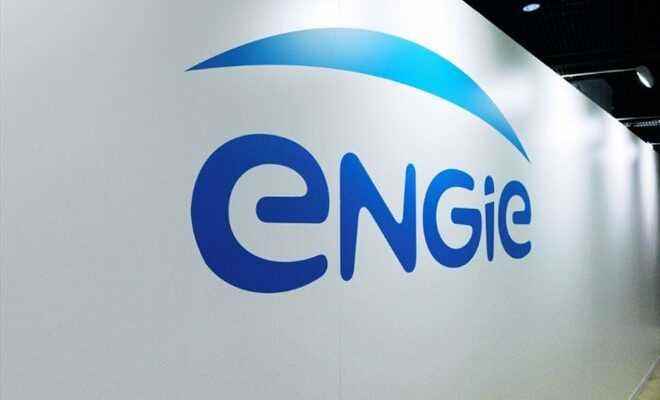Engie logo at the Actionaria show in Paris on November 18, 2016 (AFP/Archives/ERIC PIERMONT)
The two Belgian nuclear reactors whose lifespan must be extended by ten years to strengthen energy independence will be operated in a joint venture to be created between the Belgian State and the French group Engie, according to “an agreement in principle” announced jointly on Friday .
The two parties are fiercely negotiating the conditions of this extension announced in March, against a backdrop of limiting dependence on Russian hydrocarbons following the war in Ukraine.
They intend to reach “a final agreement by the end of the year and submit it to the European Commission”, Prime Minister Alexander De Croo and Energy Minister Tinne Van der Straeten said in a statement on Friday. .
For the moment, the Belgian State and Engie have agreed “on the modalities concerning the future approach, the timing and the framework of the negotiations” with a view to this definitive agreement, they underline.
This framework provides that the Doel 4 and Tihange 3 reactors – together representing a nuclear capacity of 2 GW – “restart in November 2026”, subject to the approval of the safety authorities, after a shutdown for overhaul from 2025.
They will be managed by “a new company to be created”, presented on the Belgian side as “a stable and sustainable structure in which the Belgian State and Engie share the risks as well as the benefits”.
It is “a new entity dedicated to the two units with a participation of the Belgian State and Electrabel (Belgian subsidiary of Engie, editor’s note) up to 50/50”, specifies the French group in a press release. distinct.
The Belgian government announced on March 18 its decision to postpone for ten years its total exit from nuclear power, which was scheduled for 2025.
The Engie group, which had judged this late announcement, had been making it clear to the Belgian State for four months that it wanted a sharing of the bill to operate until 2035 two of the seven reactors it operates.
Even today, Engie speaks of the “potential extension of two nuclear units”, saying that it has signed with the Belgian State “a non-binding letter of intent” on its feasibility.
The operator should certainly bear the entire bill for the subsequent dismantling of the plants, but Engie mentions “a cap” on the costs linked to the management of waste and highly radioactive spent fuel, which has already given rise to criticism, and fear that any additional cost be borne by the Belgian taxpayer.
These waste management costs “will be determined after a study, at the end of which discussions will begin around a + cap + (or ceiling, editor’s note) and a risk premium to be defined”, indicated de their side Mr. De Croo and Mrs. Van der Straeten.
For the Prime Minister, this agreement with Engie is “a crucial step”, which “brings stability in very, very turbulent times”.
“Our concern is to guarantee our energy independence”, the need for which was highlighted with the war in Ukraine, “it is a question of national security”, insisted the Minister of Energy during a conference of hurry.
The promise of a gradual exit from nuclear power has been enshrined in Belgian law since 2003 and giving up on it constituted a reversal for the environmentalist party (Ecolo-Groen) partner of the coalition of Mr. De Croo who took office on October 1, 2020.
At the time, the government agreement reaffirmed this objective of closing the country’s seven power plants by 2025.
According to Engie, a first reactor (Doel 3) must be permanently shut down at the end of September, a second (Tihange 2) on February 1, 2023, and three others gradually by 2025.
© 2022 AFP
Did you like this article ? Share it with your friends with the buttons below.




